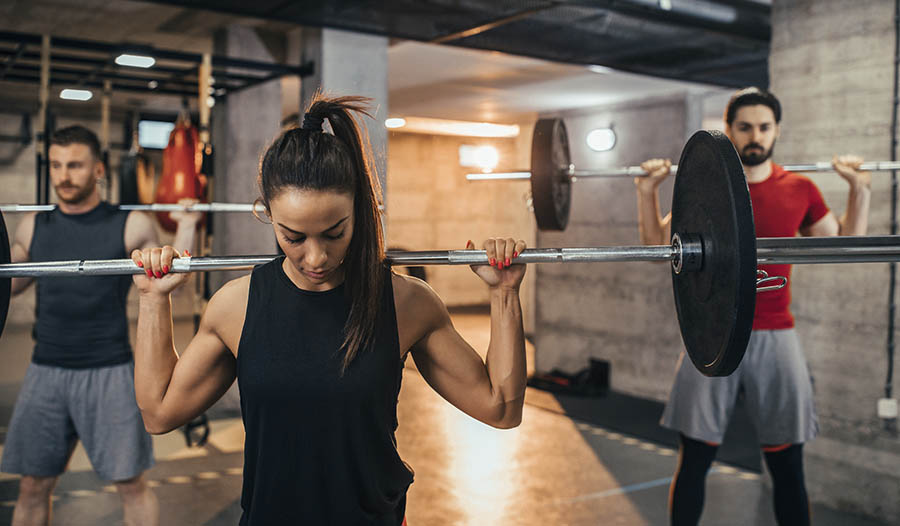The Best Foods and Supplements for Resistance Training

When it comes to resistance training, there are a lot of misconceptions regarding diet and supplementation. How much of certain food types should I eat? When is the best time to consume protein? When should I take certain supplements? Keep in mind this is a complex topic that people spend years studying—this article will serve as a very basic overview to clarify some of the common questions pertaining to diet and supplementation for strength training.
Nutrition: The Foundation
When it comes to maximizing results from resistance training there are a multitude of factors: training program and consistency, nutrition, recovery, supplementation, etc. When looking at both nutrition and supplementation, consider nutrition as the foundation and supplementation as just that… supplemental, the icing on the cake so to speak.
There are three macronutrients (groups of nutrients): carbohydrates, protein and fats. This discussion will focus primarily on carbohydrates and proteins since fats, though essential, don’t play much of a role in performance (assuming the levels are not extremely low). As a general rule of thumb, the majority of your nutrition should come from whole-food sources.
Carbohydrates
Carbohydrates function primarily as a source of fuel for the body and are stored in the liver and muscle in the form of glycogen. Some examples include fruits, potatoes and pasta. When performing multiple high-repetition sets, it is possible to start depleting muscle glycogen stores.1 Additionally, we know from extensive research on endurance sports that higher daily carbohydrate intake can help replenish carbohydrate stores. Despite a theoretical advantage to a higher carbohydrate intake, a review of the scientific literature did not find strong evidence to support many recommendations of higher carbohydrate intakes (3g/kg-7g/kg) for resistance training alone.2 In reality, carbohydrate intake is going to be individualized—for example, someone who does both endurance and strength training may benefit from a higher intake.
Protein">Protein">Protein">Protein
Protein is composed of amino acids which are essentially the “building block” of nearly everything in the body (skin, muscle, bone, etc). Unlike carbohydrates or fats, protein does not get “stored” in the body for ready-use. Some examples of protein sources include meats, milk, yogurt, eggs and to a lesser extent lentils and beans. Fortunately, unlike the research on carbohydrates, there is a much stronger consensus in the scientific literature regarding recommendations for protein intake. A daily intake of around 2g/kg will have nearly everyone covered when it comes to optimizing this key nutritional component.3 Although it’s classically been stated that protein must be consumed post-workout, there doesn’t seem to be any meaningful difference if protein is consumed pre or post-workout 4,5—the most important factor is ensuring the daily protein goal.
Supplementation
When considering supplementation for improved performance in the gym and to improve body composition, it’s important to be realistic. The key to those goals is a consistent training program and a well-balanced diet with sufficient protein. Supplements will not make you into the incredible hulk overnight and will certainly not grow muscle if you’re not putting the time in at the gym.
Protein
Protein can be supplemented in the form of a powder that gets mixed and protein bars. The most common form of powder is whey protein (milk-based), though there are powders from other sources such as soy or pea. When choosing a protein powder, ideally each serving should contain at least 2 grams of the amino acid leucine. Casein is another form of protein powder that absorbs more slowly and is typically recommended for consumption prior to bed though a recent study showed no difference when consumed in the morning or at night.6
Creatine
Creatine is most commonly supplemented with creatine monohydrate. It helps replenish energy within the muscle cells during exercise. Creatine monohydrate is very well-researched, is safe, and effective at improving strength and body composition. A typical dose is 5g/day (every day), though you won’t start seeing effects for about 1 month. If you want to start seeing results sooner you can “load” by taking 0.3g/kg for 5-7 days.7 For more information on creatine.
Caffeine
Caffeine is a powerful stimulant that is found naturally in coffee, tea and chocolate. Caffeine has been shown to acutely increase both strength (ability to generate force, ie. a 1-rep maximum bench press) and power (ability to generate force quickly, ie. a vertical jump). The effects of caffeine seem to be more consistently seen in upper body exercises more than lower body exercises.8 The doses studied range from < 1g/kg to 7g/kg consumed about 45-60 minutes prior to exercise. If you don’t consume caffeine regularly, start with 100mg (roughly the amount in a standard cup of coffee) and work your way up. Keep in mind that most studies have found performance improvements at doses > 3mg/kg. Since caffeine is a stimulant, most people will want to avoid consuming it in the late afternoon or evening as it can interfere with sleep. Be careful when using caffeine powders, as some come very highly concentrated and very high doses of caffeine can result in toxicity and even death.
Beta-Alanine
Beta-alanine (BA) is an amino acid that does not have to be consumed in the diet. BA increases the muscle levels of the substance carnosine which functions to buffer the acidic environment of the muscle during strenuous exercise. When supplemented at a dose of 4-6g per day, it can result in a modest performance improvement for exercise lasting from about 1-4 minutes.9 If your resistance training sets are typically less than 1 minute, you likely won’t benefit much, whereas if you do more extended sets or back-to-back sets in training you may stand to benefit from this supplement. The most common side effect is a tingling around the mouth, and this can be reduced by consuming smaller doses (0.8-1g/dose) throughout the day.
Citrulline Malate
Citrulline Malate (CM) is a combination supplement of the non-essential amino acid L-citrulline and malate (derived from malic acid). Though not as well studied as the other supplements there is some emerging science to show supplementing with 8g of CM about 1 hour prior to lifting can increase the ability to perform slightly more repetitions during very intense exercise sessions with multiple sets to failure.10,11
In addition to consistent training, proper nutrition and supplementation can definitely help to optimize your results in the gym. Now go out there, and make it happen!
References:
- Robergs RA, Pearson DR, Costill DL, et al. Muscle glycogenolysis during differing intensities of weight-resistance exercise. Journal of Applied Physiology. 1991;70(4):1700-6.
- Escobar KA, Vandusseldorp TA, Kerksick CM. Carbohydrate intake and resistance-based exercise: Are current recommendations reflective of actual need? British Journal of Nutrition. 2016;116(12):2053-2065.
- Jäger R, Kerksick CM, Campbell BI, et al. International society of sports nutrition position stand: Protein and exercise. Journal of the International Society of Sports Nutrition. 2017;14(1):1-25.
- Schoenfeld BJ, Aragon A, Wilborn C, Urbina SL, Hayward SE, Krieger J. Pre- versus post-exercise protein intake has similar effects on muscular adaptations. PeerJ. 2017;5:e2825.
- Aragon AA, Schoenfeld BJ. Nutrient timing revisited: Is there a post-exercise anabolic window? Journal of the International Society of Sports Nutrition. 2013;10(1):5.
- Antonio J, Ellerbroek A, Peacock C, Silver T. Casein protein supplementation in trained men and women: Morning versus evening. International journal of exercise science. 2017;10(3):479-486.
- Kreider RB, Kalman DS, Antonio J, et al. International society of sports nutrition position stand: Safety and efficacy of creatine supplementation in exercise, sport, and medicine. Journal of the International Society of Sports Nutrition. 2017;14(1):1-18.
- Grgic J, Trexler ET, Lazinica B, Pedisic Z. Effects of caffeine intake on muscle strength and power: A systematic review and meta-analysis. Journal of the International Society of Sports Nutrition. 2018;15(1):1-10.
- Saunders B, Elliott-Sale K, Artioli GG, et al. Β-alanine supplementation to improve exercise capacity and performance: A systematic review and meta-analysis. British Journal of Sports Medicine. 2017;51(8):658-669.
- Wax B, Kavazis AN, Luckett W. Effects of supplemental citrulline-malate ingestion on blood lactate, cardiovascular dynamics, and resistance exercise performance in trained males. Journal of dietary supplements. 2016;13(3):269-282. http://www.ncbi.nlm.nih.gov/pubmed/25674699. doi: 10.3109/19390211.2015.1008615.
- Pérez-Guisado J, Jakeman PM. Citrulline malate enhances athletic anaerobic performance and relieves muscle soreness. Journal of strength and conditioning research / National Strength & Conditioning Association. 2010;24(5):1215-22.
DISCLAIMER:This Wellness Hub does not intend to provide diagnosis...
















































































 Table of Contents
Table of Contents


